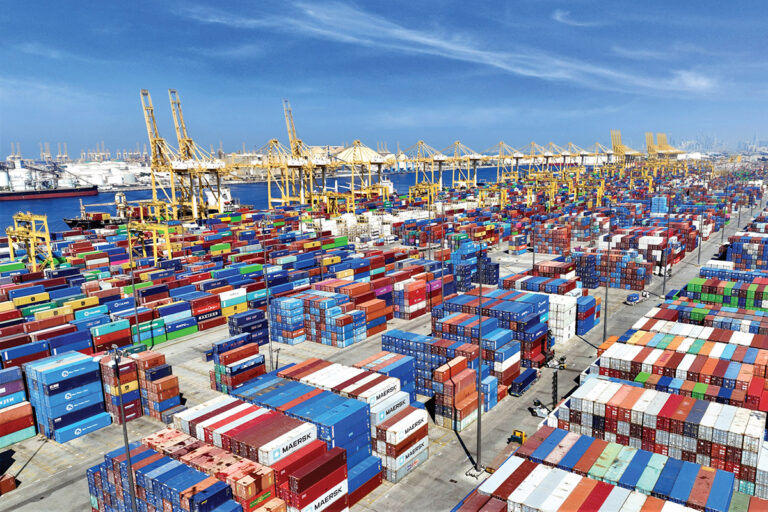The World Trade Organization’s latest annual report underscores the Middle East’s growing role in global trade governance, with high-profile ministerial diplomacy, renewed accession bids and regional leadership in dispute settlement talks set against a backdrop of slowing global trade growth.
The report, published on Thursday, reviewed WTO activities in 2024 and early 2025 and situates the Gulf’s engagement against a backdrop of slowing global trade growth, rising tariff tensions and mounting geopolitical uncertainty.
Abu Dhabi sets stage for ministerial breakthroughs
The WTO’s 13th Ministerial Conference (MC13) in Abu Dhabi in February drew nearly 4,000 ministers, senior officials, business leaders and civil society representatives for five days of intense negotiations.
Chaired by UAE Minister of State for Foreign Trade Dr Thani bin Ahmed Al Zeyoudi, the talks produced agreements to extend the moratorium on customs duties for cross-border digital flows, advance e-commerce rules and finalise an Investment Facilitation for Development (IFD) pact backed by three-quarters of the WTO membership.
The conference also saw the accession of Comoros and Timor-Leste, the organisation’s first new members in nearly eight years, and ministerial commitments to accelerate reforms in the organisation’s dispute settlement system.
WTO Director-General Ngozi Okonjo-Iweala credited the UAE’s chairmanship with helping to navigate differences among members and keeping the multilateral process alive despite what she described as “unprecedented levels of economic and political uncertainty”.
Saudi Arabia in the reform spotlight
Saudi Arabia’s Ambassador Saqer Abdullah Almoqbel chaired the WTO’s Dispute Settlement Body in 2024, a role central to one of the most sensitive reform tracks in Geneva.
Members lodged ten new dispute cases last year — up from six in 2023 — with six resolved through either negotiated settlements, suspensions or full compliance with panel rulings. The report says more members are opting for mutually agreed solutions, signalling a pragmatic shift while the Appellate Body remains paralysed by a vacancy impasse.
At MC13, ministers instructed officials to accelerate negotiations to restore a fully functioning system accessible to all members by 2024 — a deadline already missed, but where “significant progress” was noted by year-end.
Iraq’s return and regional accession momentum
Iraq resumed its WTO accession process in July 2024 after a 16-year hiatus, submitting initial goods and services market access offers.
The move, strongly backed by regional partners, is seen as a step towards bringing one of the WTO’s most under-represented regions into closer alignment with global trade rules.
The report also notes active accession talks by other economies with Gulf trade links, including Uzbekistan and Azerbaijan, and technical assistance to potential candidates such as Turkmenistan.
Regional trade trends lag global average
The Middle East was the only region to record a contraction in commercial services exports in 2024, falling 1 per cent compared to global growth of 9 per cent.
The WTO warns that the region’s reliance on energy exports and its role as a re-export hub make it vulnerable to weakening global demand for transport, logistics and investment-related services.
While merchandise trade values for the Middle East are not broken out separately, the WTO said global trade in fuels and mining products — a key Gulf export category — fell 5 per cent in 2024, partly offsetting gains in manufactured and agricultural goods.
WTO slashes global trade growth forecast
Beyond the Middle East, the WTO report signals a sharp deterioration in the global trade outlook. Merchandise trade volumes, which grew 2.9 per cent in 2024, are now forecast to contract by 0.2 per cent in 2025, a downgrade of nearly three percentage points from earlier projections.
The revision follows new tariff announcements in early 2025, with the WTO’s April Global Trade Outlook citing the impact of US trade measures under President Donald Trump’s second administration. Economists have warned that these have triggered retaliatory actions, increased policy uncertainty and disrupted supply chains, particularly in sectors such as automotive, machinery and electronics.
Services trade, although not directly targeted by tariffs, is also expected to slow to 4 per cent growth this year, down from 5.1 per cent under a “low-tariff” scenario. The WTO says higher duties on goods reduce demand for related services such as transport, logistics and travel, while weaker economic growth curbs investment-related spending.
Risks of fragmentation
Okonjo-Iweala cautioned that “potential signs of fragmentation” along geopolitical lines risk undermining global economic growth, with the steepest welfare losses likely for low-income economies.
Still, the report notes that most-favoured-nation tariff terms continue to underpin roughly 74 per cent of global merchandise trade, providing a degree of stability amid rising protectionism.
For Gulf economies, the stakes are high: as they pursue diversification and services-led growth, shifts in global trade flows, tariff regimes and dispute settlement outcomes could directly affect investment strategies and export competitiveness.
“Predictable trading conditions are not just an abstract principle for this region,” said one Geneva-based trade delegate from a Gulf member state. “They are critical for the long-term viability of our economic transformation plans.”

